WILDLIFE BLOODBATH
More than 60% of rhino killings now in KwaZulu-Natal as poachers shift from ‘battered’ Kruger Park
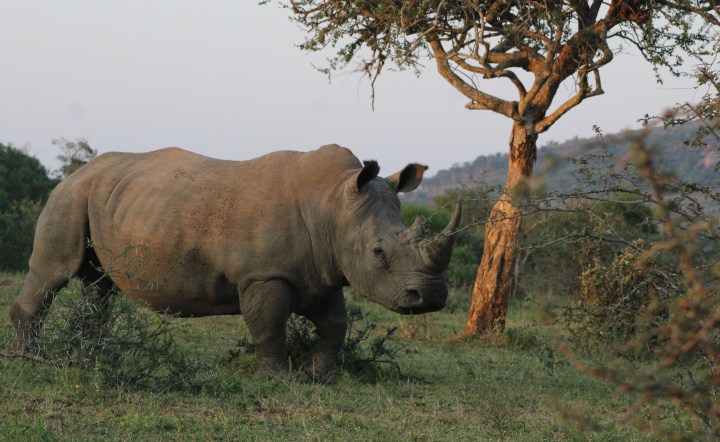
Fifteen years after South Africa was hit by an unprecedented wave of rhino-horn poaching, the slaughter rate remains relentless – with one rhino shot almost every day in KwaZulu-Natal, the historic heartland of global rhino conservation.
More than 60% of the rhinos killed in South Africa so far in 2023 drew their last breaths in KwaZulu-Natal as poachers continue to shift more of their deadly firepower and axes to the Hluhluwe-iMfolozi Park, one of the world’s last strongholds of wild rhino conservation.
Latest poaching statistics for the first six months of 2023 show that 231 of these animals were gunned down nationally over this period. Of these, 143 rhinos (or more than 60% of the national total) were shot in reserves managed by Ezemvelo KZN Wildlife. In comparison, only 43 were poached in the much larger Kruger National Park that was home to more than 10,000 fewer than two decades ago.
Announcing the latest rhino poaching statistics at a media briefing at SA National Parks headquarters in Pretoria on 1 August, Environment Minister Barbara Creecy said her officials were in discussion with Ezemvelo on further measures to stem the KZN slaughter in particular.
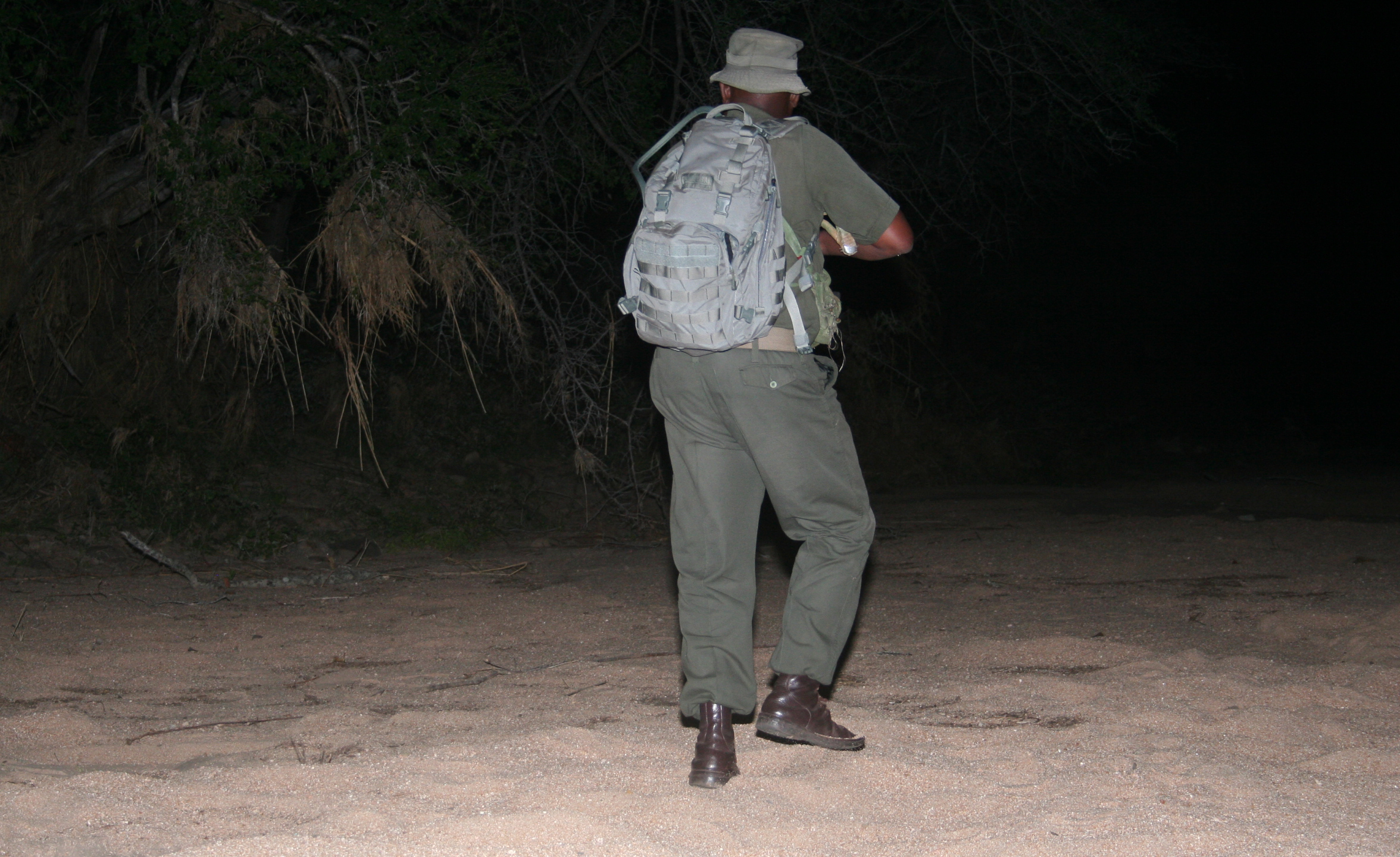
A member of the SA National Parks anti-poaching unit patrols a river bank after nightfall in the Kruger National Park. (Photo: Tony Carnie)
She confirmed that the option of dehorning rhinos in the 96,000ha Hluhluwe-iMfolozi Park was one of the options being discussed, but no decisions had been taken yet.
In the interim, her department had provided R40-million to Ezemvelo to repair or replace numerous weak points in the reserve’s boundary fence “which is regularly breached and through which wild animals can escape to nearby communities”.
Creecy said a Tactical Operations Joint Control Centre had also been established recently to facilitate the deployment of South African Police Service personnel to Hluhluwe-iMfolozi Park, while the National Prosecuting Authority had also designated a dedicated prosecutor to facilitate rhino poaching cases in KZN. Cases were also being “prioritised and identified to be expedited through the court processes”.
With regard to the Kruger Park, the 42 rhino killings there so far this year reflect an 11% decrease compared with the same period in 2022.
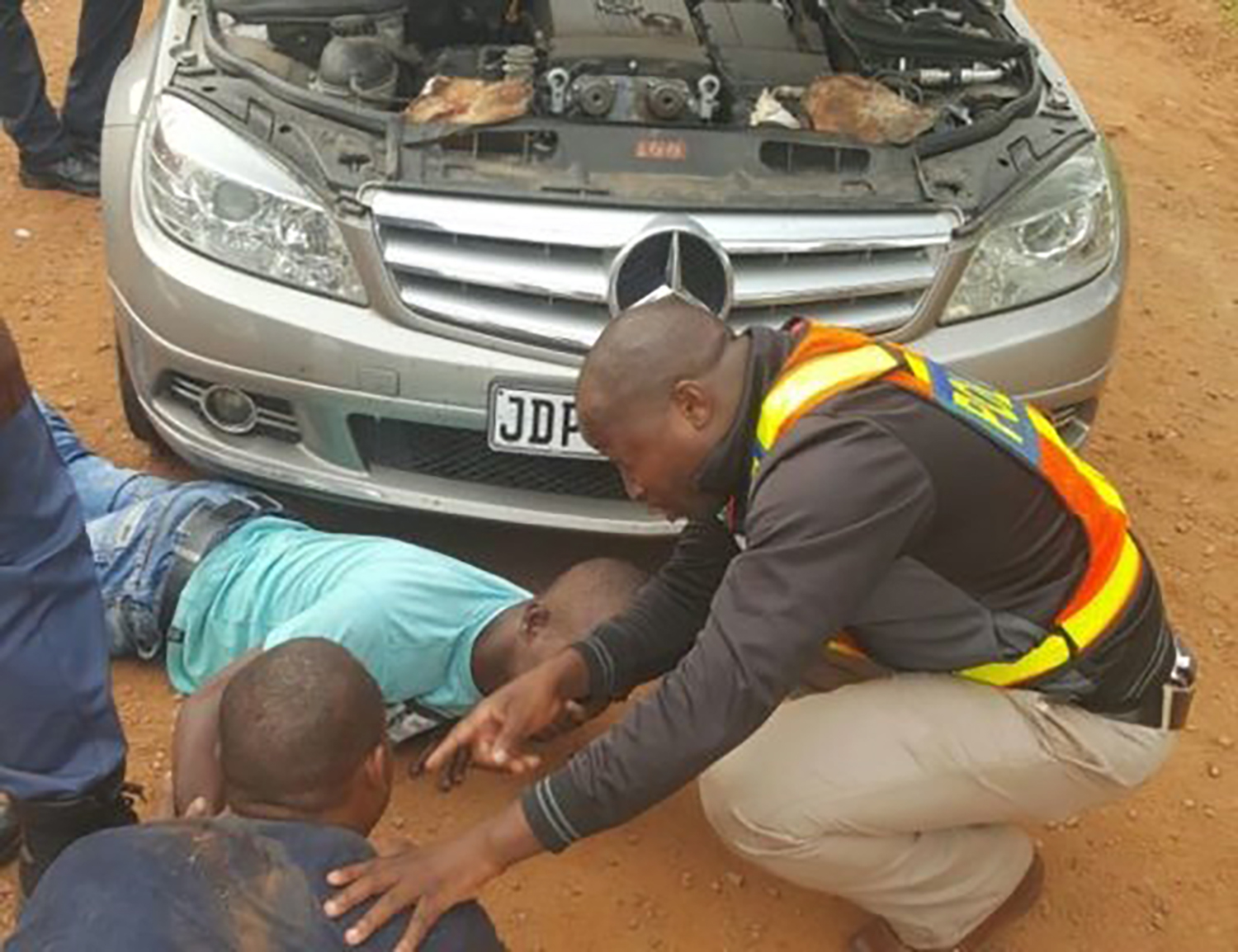
These two alleged poachers were stopped at a roadblock near Phongola in 2017. Two large rhino horns were found stuffed inside the engine compartment of the Mercedes-Benz they were driving.(Photo: SAPS )
Kruger’s rhino population has been “severely battered” over the past 15 years, Creecy acknowledged, but she declined to advertise the number of rhinos remaining in this park, or other rhino reserves nationwide.
Nevertheless, there are strong indications that the Kruger’s rhino population had dropped to about 2,500 – less than a quarter compared with two decades ago.
According to SANParks’ latest annual report (2021/22), more than 800 rhinos were dehorned in Kruger over the past financial year – an expensive and desperate measure to make the survivors less-attractive targets to poachers.
The SANParks report also notes that Kruger lost 195 rhinos to poachers during 2021/22, compared with 247 in the previous financial year.
Expensive tactic
While dehorning has been lauded as a successful strategy by many private-sector reserves to decrease poaching (or to deflect pressure to more vulnerable reserves) this remains an expensive option – especially considering that the animals’ horns have to be “retrimmed” regularly to remain effective.
Quite apart from debasing the iconic, horned grandeur of the second-largest mammal in the world – and their tourism appeal – recent research in KZN has also indicated that dehorning black rhinos may alter their natural behavioural ecology.
The nationwide poaching crisis began to escalate dramatically from about 2008 and reached a point where more than 1,000 of these animals were killed each year for nearly five years in succession.
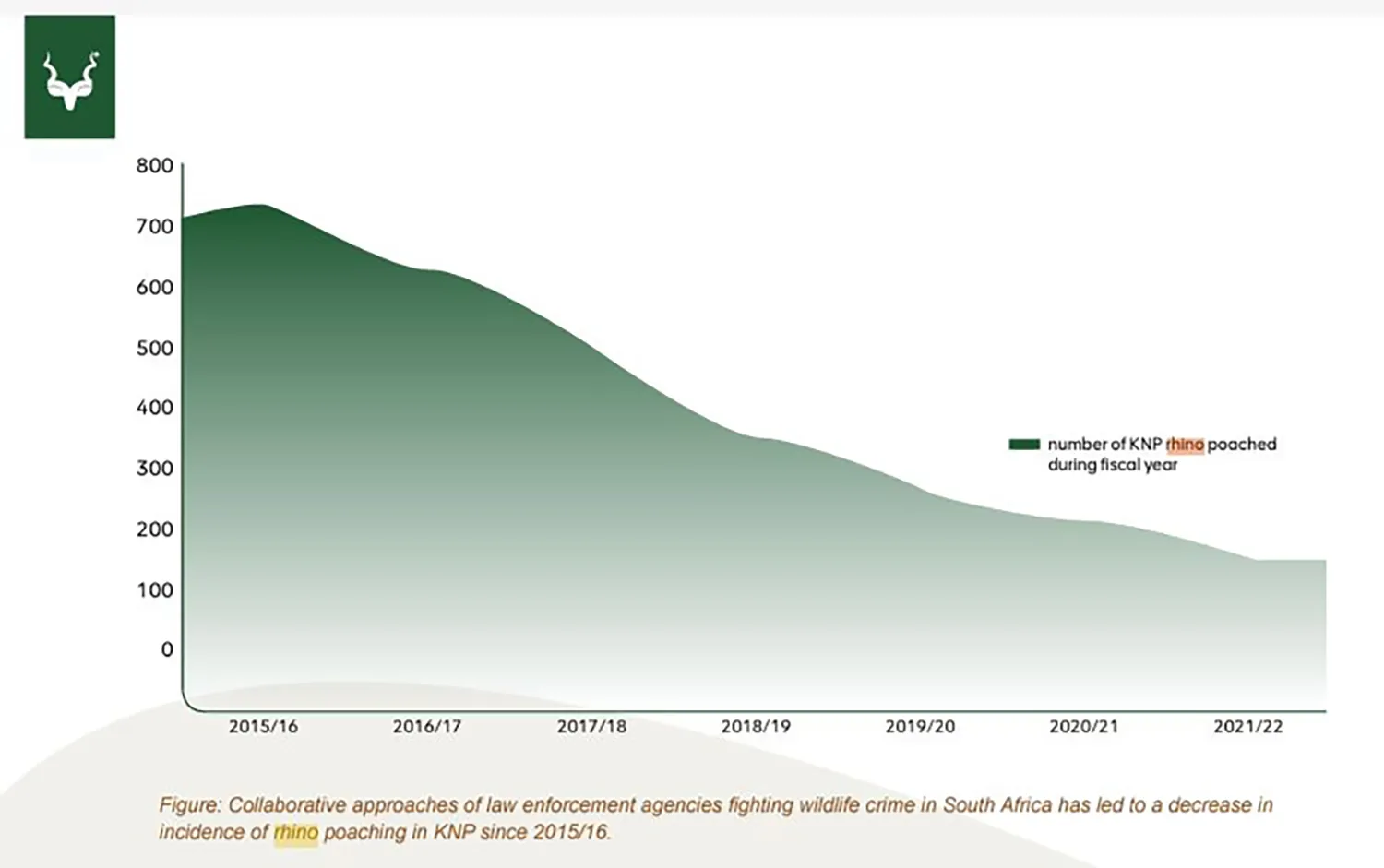
A graph showing the steady decline in rhino poaching cases in the Kruger National Park. (Source SA National Parks Annual Report)
Since then, the poaching rate has declined – partly due to more intensive anti-poaching measures, but also reflecting the sombre fact that the national “larder” of rhinos has been steadily decimated by organised crime syndicates based in China and the Far East.
Is there any light at the end of this dark tunnel – or any long-term solution to the horn poaching crisis?
In response to this question, Creecy said she did not believe there was a “silver bullet” solution on the horizon.
“I think the reality is that there will continue to be a battle against rhino poachers for the foreseeable future.”
However, Creecy said she was encouraged by the apparent “steady decline” in poaching, while much stiffer sentences were being imposed on convicted poachers by the courts.
“In the first six months of this year our hard work with both the SAPS and the NPA has led to the conviction of 31 offenders. The majority of sentences were custodial. In Skukuza one suspect found guilty of killing three rhino and possession of unlawful arms and ammunition was sentenced to an effective 32 years’ imprisonment.
Read more in Daily Maverick: Enforcing horn trade ban — the world needs to channel its inner rhino mom
“In another matter, three accused, found driving in Kruger National Park, with five rhino horns hidden in the vehicle, a hunting rifle with a silencer, ammunition and knives, were convicted for the killing of three rhinos in the park, possession of unlawful firearms and ammunition, possession of dangerous weapons and trespassing. Accused 1 and 2 were sentenced to 34 years’ imprisonment, while accused 3 was sentenced to 39 years.
“In Limpopo, an accused individual was sentenced on a charge of murder, killing of two rhinos, unlicensed firearm and ammunition to an effective sentence of 24 years’ imprisonment.

Environment Minister Barbara Creecy. (Photo: Felix Dlangamandla)
“In the Eastern Cape, six accused were convicted on charges of conspiracy to commit rhino poaching (notably no rhinos were killed) and the possession of unlicensed firearm and ammunition and effectively sentenced to imprisonment ranging from 16 to 20 years.”
Lie-detector tests for new recruits
Paying tribute to the continued bravery and dedication of game rangers on the front line of wildlife poaching, she also noted that new recruits to SANParks would now have to undergo integrity testing (lie-detector or polygraph tests), though the current employment contracts of most existing rangers did not provide for such testing.
State conservation agencies were still “trying to reach agreements” with labour unions around mandatory integrity testing for all staff involved in rhino protection.
“In response to a range of studies that point out collusion between our ranger services and criminal syndicates, the Kruger National Park has developed a holistic Ranger Services – Integrity Management Plan.
Read more in Daily Maverick: Rhino poaching decreases as South Africa tackles threat
“This plan aims to improve ranger morale and resilience to corruption by providing services that enhance ranger health and well-being, provide training and counselling, offer a range of financial management services and debt management.
“The Ranger Service has also enlisted the Association of Savings and Investment South Africa Foundation to provide specialised Financial Literacy Training for all field rangers. This was attended by 334 employees.”
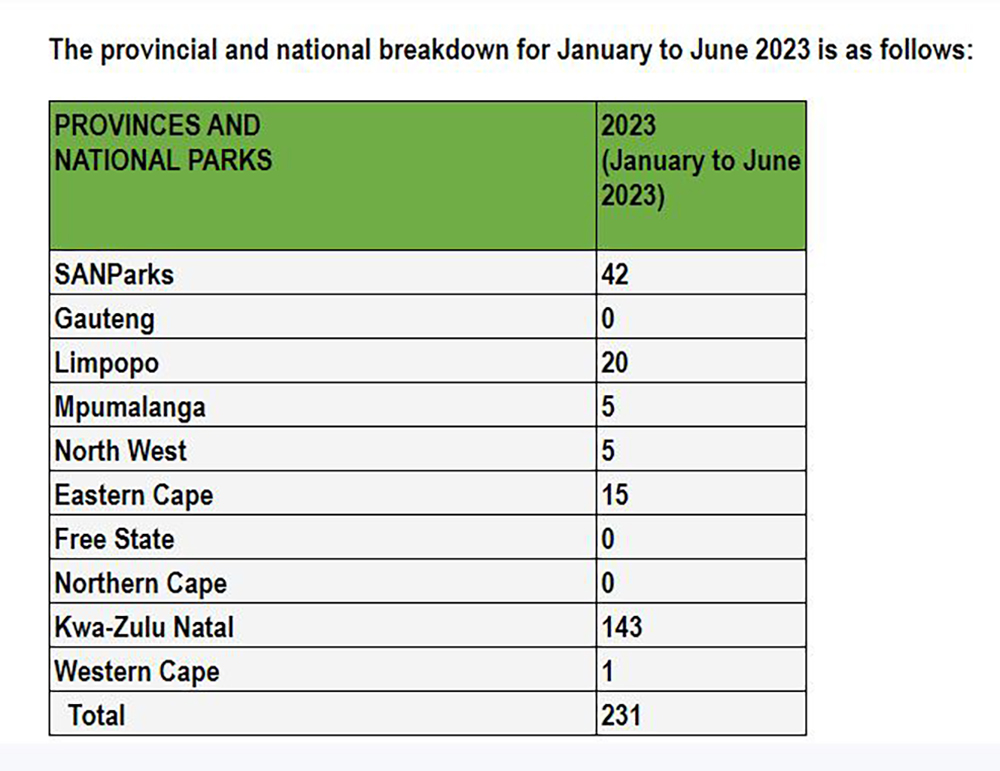
Latest poaching stats. (Source: Department of Forestry Fisheries and Environment)
Noting that many of South Africa’s national parks are adjacent to areas of extreme poverty, she said SANParks held a number of stakeholder engagements with entrepreneurs over the past four years aimed at expanding the provision of community goods and services to neighbouring national parks.
Responding to the latest poaching toll in its reserves, a spokesperson for Ezemvelo said: “There has been an ongoing discussion between the minister and our MEC, Mr S Duma, which has resulted in the Department of Forestry, Fisheries and Environment committing to financially support the provincial fight against rhino poaching.
“The high numbers indicate that the rhino poaching syndicates have moved from Mpumalanga to KZN. We, however, shall continue to protect our rhinos to the best of our abilities using the available resources.”
The public can report any suspicious activities around wildlife to its environmental crime hotline on 0800 205 005 or the SAPS number 10111. DM



















 Become an Insider
Become an Insider
Ms. Creecy is sacrificing rhinos on the altar of “No horn Sales”. Poaching kills rhinos, but farming them for legal horn sales does not, so why not legalize horn sales? South Africa has the most rhinos, so why are we not calling the tune? Because, I suspect, Creecy and cohort have some ideological antipathy to farming rhinos. If there is another reason I would like to hear it.
Agree 100%, the sooner they legalise the sale of rhino horn the better for the rhino’s. At the moment keeping rhino’s privately is a loss making exercise and they are worth more dead than they are alive. What is so sad is that the do not need to be killed for their horns and they can be farmed very successfully.
Agree with both of you but don’t expect a sensible assessment from anyone in power. The decline in Rhino poaching numbers does not necessarily reflect an improved situation. In the KNP for example, if numbers have declined from 10 000 to 2 500 then it is fair to assume they are harder to find thus fewer are butchered. What depresses me more than anything is that the content of Rhino horn is easily identified by simple science and can be synthesised so how to explain the insane value of the product and low mentality of the buyers mostly concentrated in the ancient civilisations of Asia?? Depressing. Homo sapiens is in the main a brutal and stupid mammal species.
Tony-Geoff C from Durban sends his regards
The “insane value of the product” is determined by the insanity of the buyers who ignore the simple truth that rhino horn is not “magic”. Why we should not breed rhinos to harvest their horns? Because it would be unethical to subject an animal to repeated harvesting of its body parts, just for profit.
“Because it would be unethical to subject an animal to repeated harvesting of its body parts, just for profit.” Cows are milked every day, is this unethical? It would be more unethical to not farm rhinos and allow them to go extinct, which is where present policies are leading us.
The Chinese syndicates should farm rhino’s instead of killing them off. Stupidity of the worst kind.
Very good idea and the industrious Chinese would be perfect entrepreneurs to start such a venture. Africa should help them with a seed stock